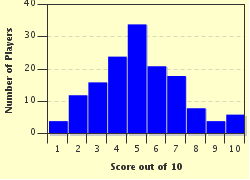Quiz Answer Key and Fun Facts
1. Winston Churchill once spent time behind bars but as a prisoner of war. Which war was it?
2. Muhammad Ali was arrested on 28 April 1967 and found guilty two months later. What crime was he convicted of?
3. In May 1895, Oscar Wilde was convicted of gross indecency and sentenced to two years hard labour. Who else was tried alongside of Wilde and received the same penalty?
4. Mahatma Gandhi, "Father of the Nation" was tried in 1922 by the British on a charge of conspiring to overthrow the government and was sentenced to six years in jail. Whilst he is best known to the world as a leader of the Indian independence movement, what was his original profession?
5. The conviction of the Birmingham Six for the bombing of two Birmingham pubs was quashed in 1991. What was the name of one of the two pubs that was bombed?
6. Giacomo Girolamo Casanova de Seingalt (Casanova) was arrested and sentenced to five years for "public outrages against the holy religion". In which city was he imprisoned?
7. Which Russian writer, author of "The House of the Dead", was exiled for four years to a hard labour camp in Siberia?
8. French novelist Émile Zola risked much when he published "J'accuse", an open letter to the French President, protesting against the conviction of Captain Alfred Dreyfus. Which of these was NOT a consequence of his action in publishing the letter?
9. Benito Mussolini spent two weeks in jail for his role in promoting a general strike. In which country did this event occur?
10. Prior to commencing his parliamentary career, Australian Greens' politician Bob Brown spent 19 days in Tasmania's Risdon Jail for his part in attempting to blockade construction work to dam the Franklin River. On the day of his release from prison something special happened. What was it?
Source: Author
cazza2902
This quiz was reviewed by FunTrivia editor
Snowman before going online.
Any errors found in FunTrivia content are routinely corrected through our feedback system.


